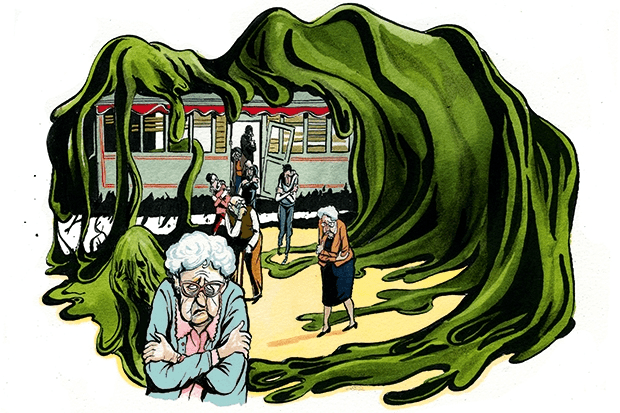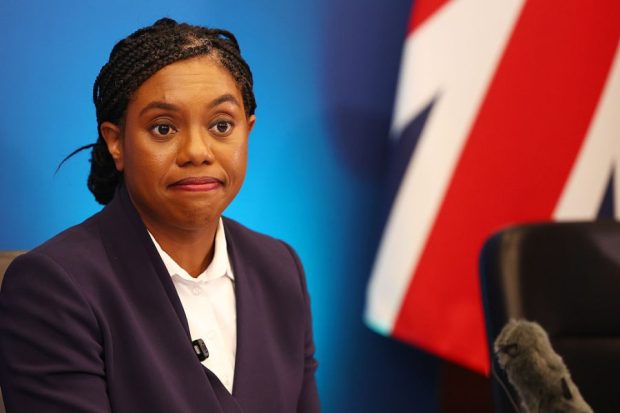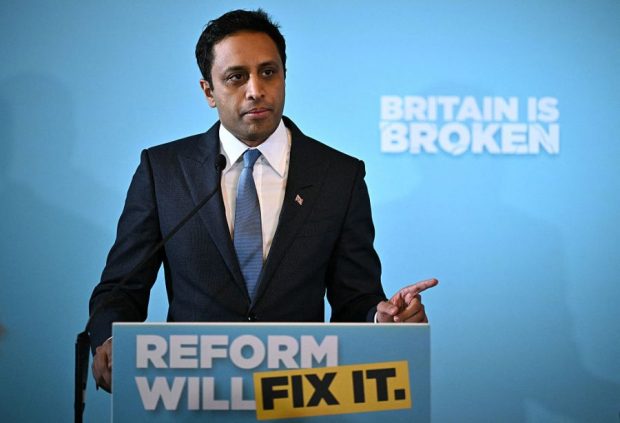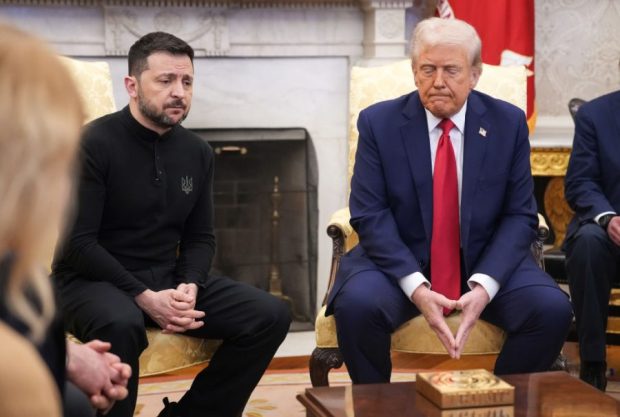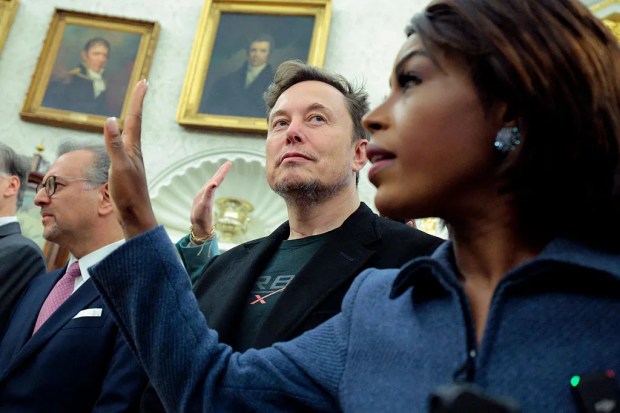The last few weeks have served as a reminder of the sort of conspiratorial, self-excusing hole the Conservative party could well go down in opposition. Speaking in the United States, Liz Truss blamed her premiership collapsing on the ‘wokenomics’ of the ‘deep state’, giving succour once more to the idea that the Tory party could have done what it wanted, could have governed better, were it not for The Blob. It’s a seductive argument, but a dubious and self-defeating one if the party wants to gain power again.
Blaming the levers of government for a lack of change is a poor argument that makes the party weak and pointless
When the party is, almost inevitably, in opposition there is a chance this line of thinking will fully take hold. If it does, it will mean years of whining and very little winning. As reassuring as it might be for senior politicians, abandoning the agency of leaders in this debacle results in two things: speaking only to a shrinking, aggrieved pocket of voters, and failing to address how the party might be effective next time.
If the party wants to return to government, it has to reject both of these outcomes. It must accept how much of its predicament is its own making, and understand better both what it wants to do and how to do it next time. It must also find a way to convince the public to trust it again, rather than using these self-obsessed excuses. Ultimately, blaming the levers of government for a lack of change is a poor argument that makes the party weak and pointless.
The Conservative party is right to be disappointed with what it has achieved in the last 14 years. It is wrong to try to blame dark forces, lingering Blairism, civil servants or structures for that. Ultimately, its failures have been driven more by how it has chosen to spend political capital, how it has utilised power, and the outcomes it has pursued. If it has failed to get a grip on the machinery of government and deliver its aims, it has only itself to blame.
First of all, whining about the system ignores where the Tory party has got stuff done. Often its policies were unpopular with vested interests yet were driven through regardless – usually because of energetic ministers committed to the cause. In education, there has been significant change. Academisation has been hugely expanded, as has the government’s free schools programme. Curricula and exams have been reformed too, with the abolition of AS Levels and the removal of coursework from most assessments. Much of this was done in the face of opposition in the sector.
The same is true for Andrew Lansley’s reforms of the Health Service. Despite being opposed by many within the sector – who were largely vindicated afterwards – these reforms were carried out and implemented. Chris Grayling managed to push through his privatisation of probation services (another failure), while Iain Duncan Smith created Universal Credit. Each of these policies, whatever their merits, was a big, complicated, and contested reform, and the government managed to get it done. It’s hard to reconcile this with the conspiracist mindset.
Even more striking, of course, are the two main projects that have defined this government – austerity and Brexit. The Tory cuts of 2010 onwards were largely implemented. Benefits were reduced, councils received less money, legal aid was slashed and public sector pay was restricted. None of this seemingly bestirred the high-spending socialists of wokenomics. Equally, the referendum was pursued and its result was implemented, in the face of internal and external resistance, largely because the government used its political capital on it. The idea of a party beholden to the Deep State is pretty risible on this record.
Beyond that, those who criticise The Blob seem to misunderstand the dynamics of politics. On the right, it is often argued that Tony Blair used the state to make a return to conservatism impossible – festooning the state with quangos, devolution, the HRA and Equality Act and more to ensure a permanent left-wing block. Even if it’s true, that’s smart politics, not conspiracy. The purpose of politics is to do things you want to do and make them durable. That the left has been able to do this, and the Tories not, is evidence of their lack of will to wield power. It’s pretty much like complaining that the other team won’t let you score.
Throughout this period, the Tories have failed to address many of the things they have been complaining about. There has been little appetite for filling external bodies with fellow travellers or constraining their remit. Left-leaning organisations have often been embraced rather than rejected when it comes to the third sector. If something was holding the Tories back, it was simply impotence. Either they didn’t recognise it, or they understood that the political fight would not have gone their way.
Indeed, this is another failure of the mindset behind the Tory whiners. Far too often, they conflate calumny with ‘consequences’. This is most true with Truss and her bungled budget. The fallout from decisions, or even advice about it, has been recast as something sinister. In reality, this is a sign of the Tories either making a cost-benefit calculation or failing to steel themselves for the outcomes they supposedly wanted. Whether political or economic, you can’t blame trade-offs for existing. Most of what the Tories have failed to do is because, ultimately, they chose not to do it.
The question for the post-apocalypse party is whether it will indulge or interrogate these narratives. There’s an obvious comfort in a retreat to Scooby Doo-ish ‘We would have done it all if it weren’t for the pesky Blob’. It fuels political grievances and absolves the party of blame. It will no doubt play well with a shrinking, more extreme membership, increasingly disconnected from the rest of the electorate. But it doesn’t get anywhere near a solution – and it won’t get the party anywhere near power again.
In opposition, the choice for the party will be whether to be winners or whiners. There is a case that Westminster and Whitehall are averse to effective action, that their processes are slow and their decision-making is oriented against reform. If you wish to govern again you need to have a plan to fix that, not just whinge that the civil service got in your way last time. To paraphrase Sean Connery in 90s classic The Rock, ‘Losers whine about The Blob, winners go home with the prom queen’.
The more the Tories talk about Whitehall conspiracism, the less time they will spend on the things that matter to voters. The Blob and Whitehall dynamics might be captivating to commentators and the very online but they matter little to people facing rising prices and deteriorating public services. Fundamentally, the public is uninterested in why the government feels like a failure, they only care that it is. That’s why sympathy is running out, and a return to government will have to be built on a programme that meets people’s needs.
If all the party has left is harping on about policies that it can’t implement there is little point to it. Equally, if it is unable to see the reality of why things have gone wrong in the past few years, it has little chance of winning back public trust. As an entity, it can spend five years of opposition lamenting the frustrations it felt in office, relitigating why it reached this low – but that is unlikely to resonate with the electorate. Instead, it will have to find some dynamism, some will to recover and either solve these problems or find a way around them.
Ultimately, this is all a self-indulgent argument born of failure. Politics should be about getting stuff done. If the system is holding you back, you have to find a way to change the system. The Tories haven’t, either because they lacked the ideas and the will, or because they were actually fighting gravity. Attacking The Blob fires up your base but will wear thin with the electorate, and unless channelled into something productive will stymie the party’s recovery. No one likes a whiner, and a party that sounds like a victim is unlikely to appeal to anyone. Resorting to whining after the election will only lead the party down a blind alley.

